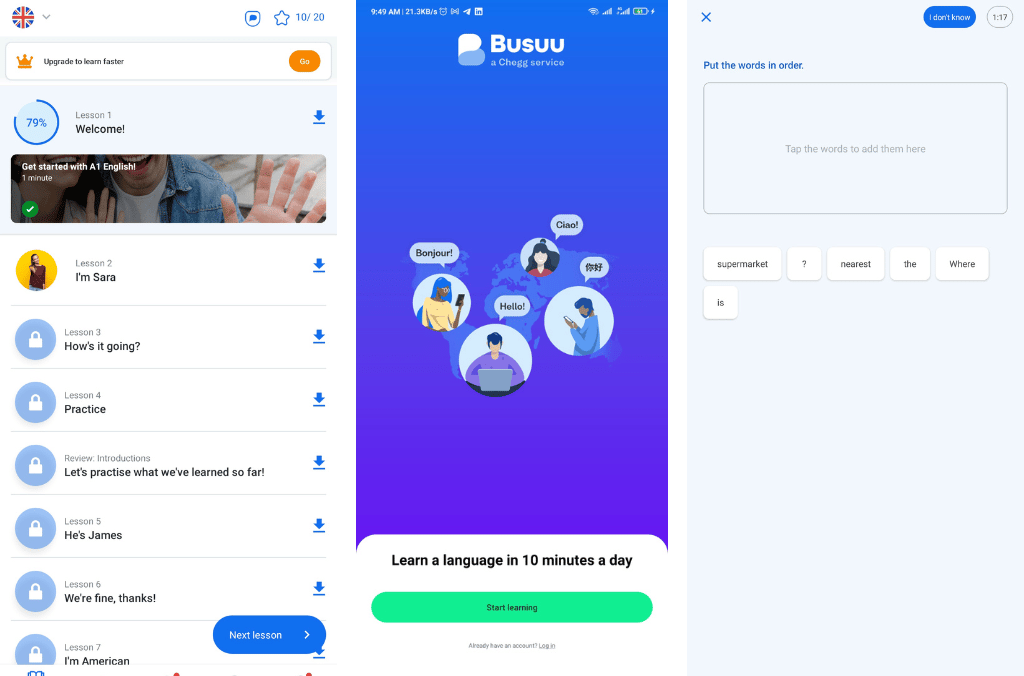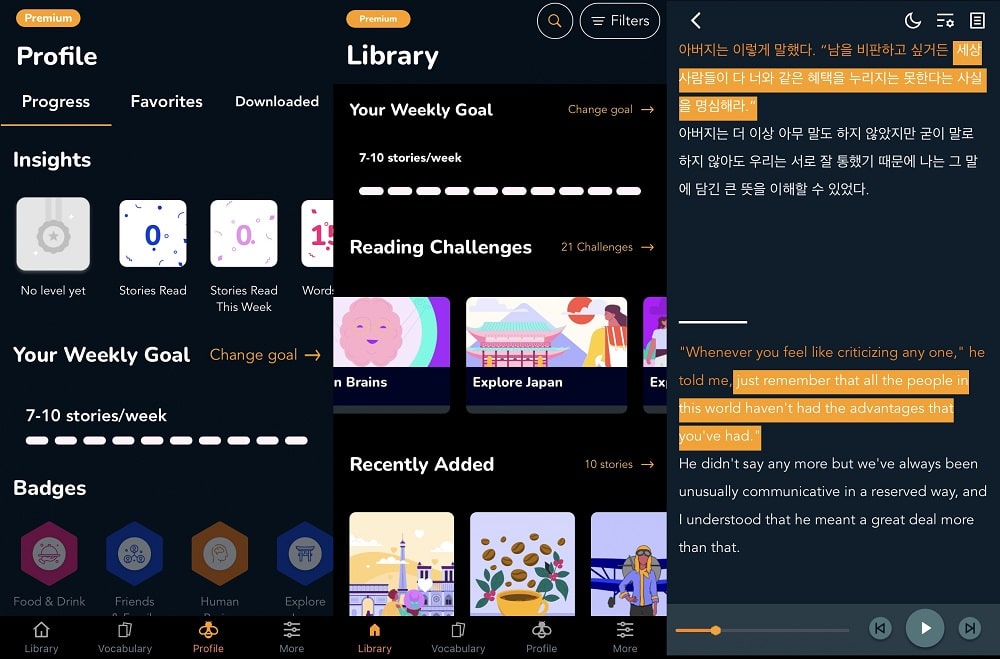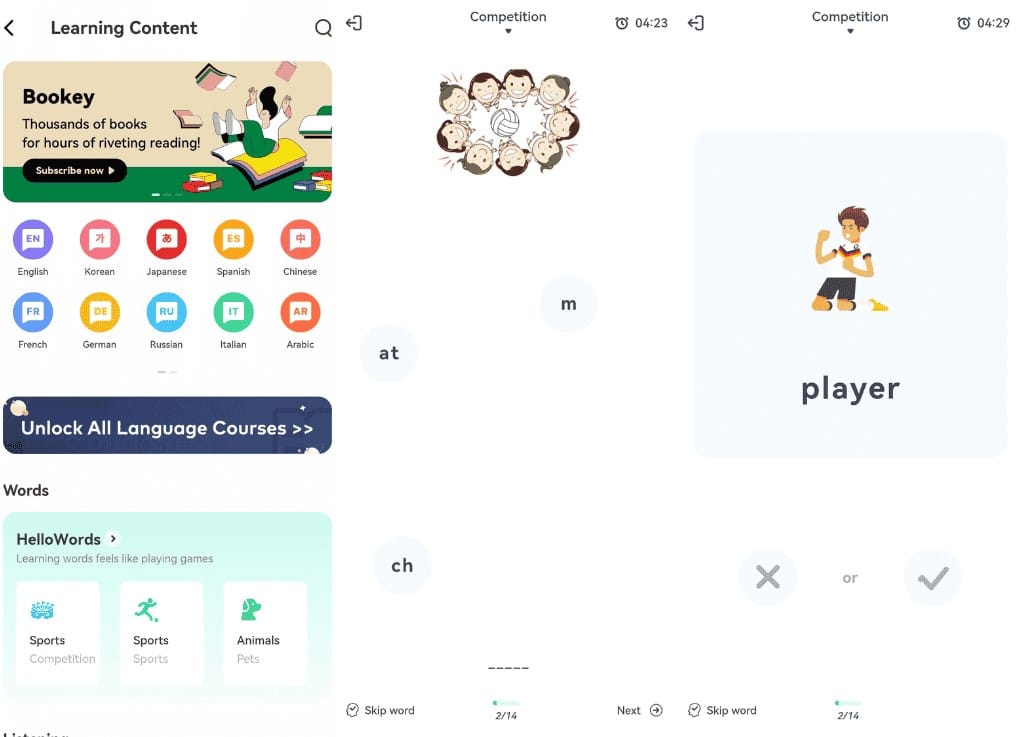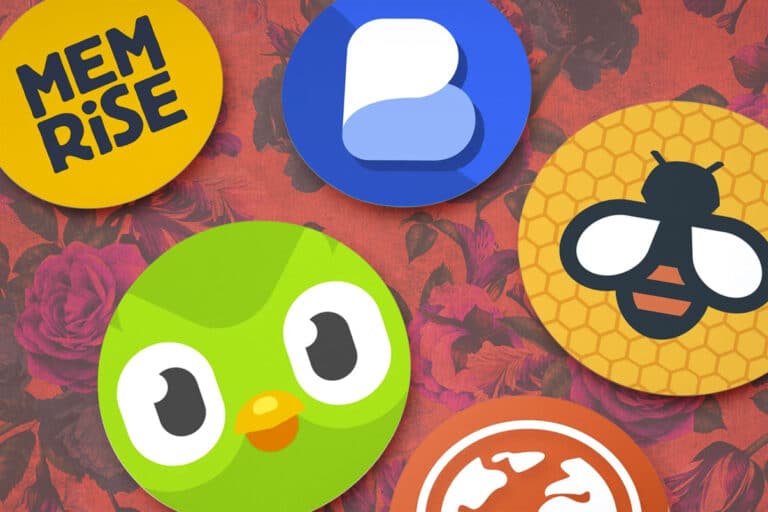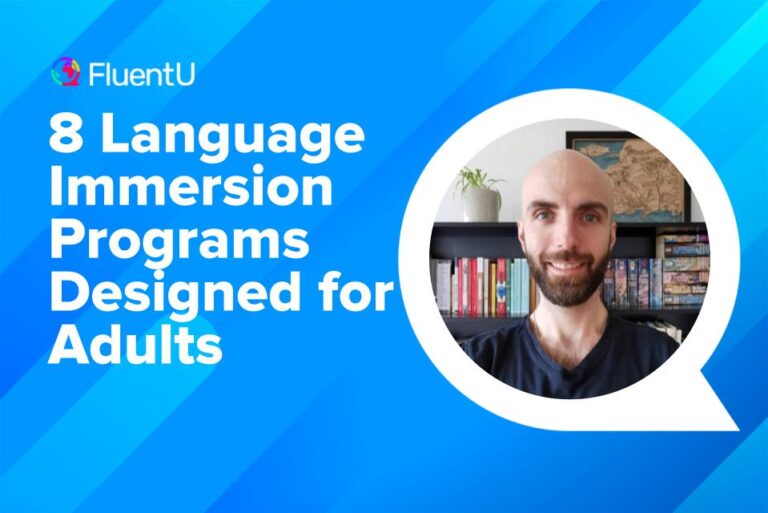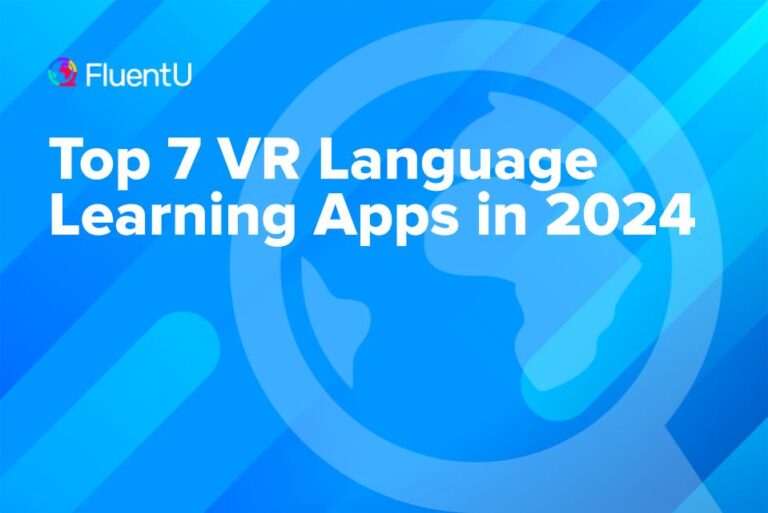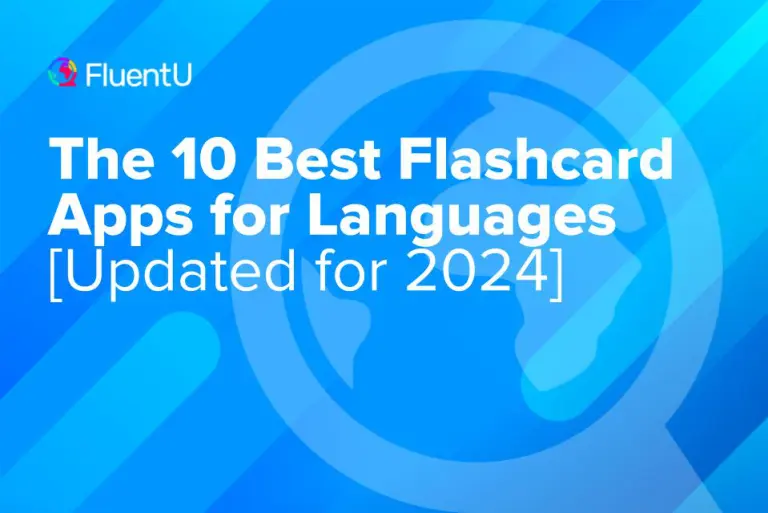Contents
- 1. Best Overall: Busuu
- 2. Best for Beginners: Mondly
- 3. Best App for Learning with Video: FluentU
- 4. Best for Traditional Structured Courses: Babbel
- 5. Best App for Vocabulary: Memrise
- 6. Best for Immersion Learning: Rosetta Stone
- 7. Best for Audio-based Learning: Pimsleur
- 8. Best Flashcards App: Lingvist
- 9. Best for Gamified Language Learning: Duolingo
- 10. Best App for Visual Learning: Drops
- 11. Best for Reading Fans: Beelinguapp
- 12. Best App for Language Exchange: HelloTalk
The Best Language Learning Apps [2024 Edition]
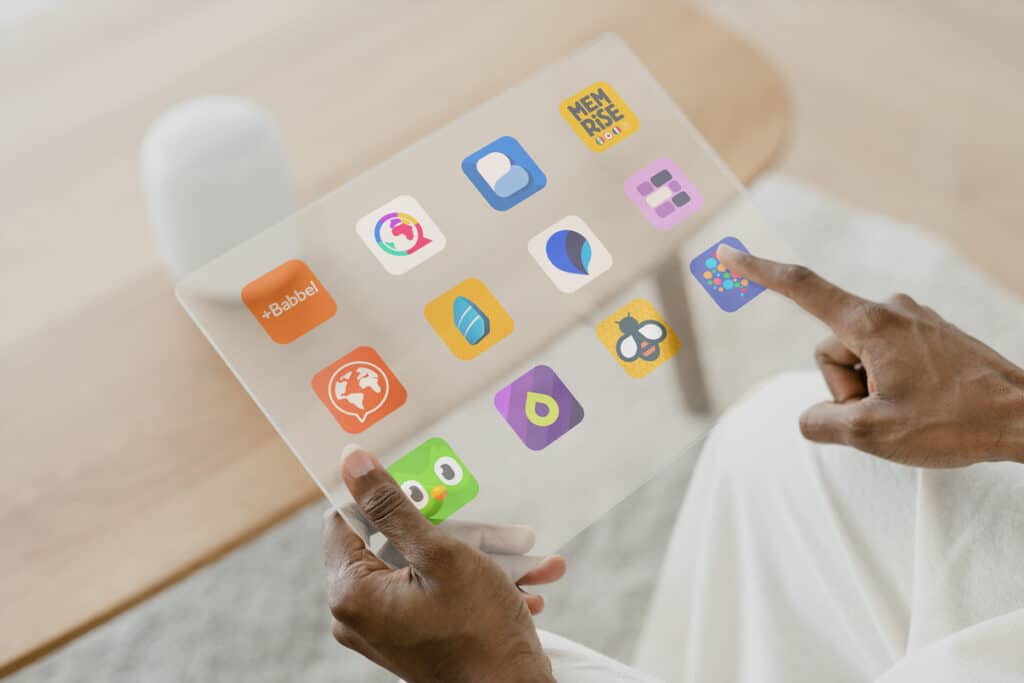
Everyone has their own unique way of learning new things, so the best language learning app for you should be perfectly suited to your specific learning style. Fortunately, we’re spoiled for choice in 2024!
There are a wide array of options, from classically structured courses and language learning game apps to language exchange apps so you can talk with native speakers from around the world.
I’ve looked through all types and styles of apps to find the 12 best language learning apps on the market for every type of learner—and here they are. Read on for all the details!
Download: This blog post is available as a convenient and portable PDF that you can take anywhere. Click here to get a copy. (Download)
| App | Best For | Link |
|---|---|---|
| Busuu | Best overall | See Busuu |
| Mondly | Best for beginners | See Mondly |
| FluentU | Best for learning with video | See FluentU |
| Babbel | Best for traditional structured courses | See Babbel |
| Memrise | Best for vocabulary | See Memrise |
| Rosetta Stone | Best for immersion learning | See Rosetta Stone |
| Pimsleur | Best for audio-based learning | See Pimsleur |
| Lingvist | Best for flashcards | See Lingvist |
| Duolingo | Best for gamified language learning | See Duolingo |
| Drops | Best for visual learning | See Drops |
| Beelinguapp | Best for reading fans | See Beelinguapp |
| HelloTalk | Best for language exchange | See HelloTalk |
1. Best Overall: Busuu
A Quick Busuu Review
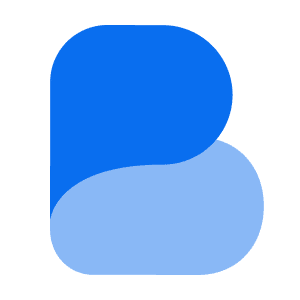
Name: Busuu
Description: A learning program that prioritizes listening and speaking, thanks to a speech recognition tool.
14 Languages offered: Russian, Spanish, Portuguese, Japanese, English, French, German, Italian, Dutch, Mandarin Chinese, Arabic, Turkish, Polish and Korean.
Offer price: Free (limited access); $13.95/month or $83.40/year
Summary
I recommend the Busuu premium plan for serious learners. The free version is fun but very limited. Busuu is impressive in terms of getting speaking practice and learning conversational vocabulary, but there’s still room for improvement.
-
User friendliness - 8/108/10
-
Delivers on promises - 8/108/10
-
Authenticity - 7/107/10
-
Value for price - 9/109/10
Pros
- Personalized language goals
- Explanations of vocabulary, grammar and culture
- Comprehension checks to learn new words thoroughly
- Option to record answers and get feedback from native speakers
Cons
- Limited selection of languages
- Quality varies depending on your language course
- Content is somewhat lacking in entertainment value
- It’s possible to receive incorrect corrections
Busuu has fun short lessons, personalized reviews and one of the best parts: you get feedback from native speakers. The app is good for all levels of learners. If you don’t know your level, a proficiency test will determine your level and then you can start on one of the 150 units available.
Busuu’s option to have your exercises corrected by native speakers really takes the program over the top for me. There’s nothing like personalized feedback from native speakers.
The Busuu app offers 12 language options.
Here’s our full review of Busuu:
The Complete Busuu Review of 2024: A Beginner Tool for Learning Conversational Basics
Busuu is a popular language learning program that offers 14 languages. Click here to read our in-depth review. We’ll look at where Busuu wins, what could be improved, who…
2. Best for Beginners: Mondly
Overview

Name: Mondly
Description: An app that provides short bursts of learning through fun and high-tech methods.
Languages offered: 33 languages including Spanish, French, Italian, Russian, Danish, Arabic, Japanese, Greek, Romanian, Vietnamese, Hindi, Hebrew, Polish, Bulgarian and more.
Offer price: Base program is free; premium content available with a monthly subscription at $9.99/month or $47.99/year
Summary
Mondly tries to push language learning into the next generation through snappy daily lessons, competitive events and innovative features like AR, VR and chatbots. While this makes for a unique and engaging experience, level differentiation and uneven language instruction hold it back from being the best in its field.
-
User friendliness - 9/109/10
-
Delivers on promises - 8/108/10
-
Authenticity - 7/107/10
-
Value for price - 4/104/10
Pros
- High-tech, innovative features draw your attention
- Leaderboards fuel competition and make learning fun
- All languages can be set as target or native language
Cons
- Lack of differentiation between the different levels
- Need an annual membership for access to multiple languages
- Advanced features can feel a bit forced and unnatural
- Some languages could use more development
Mondly uses daily lesson plans and short lessons arranged by topic. The app helps you hit the ground running by having you memorize keywords right off the bat. So because of this, it’s a great choice for beginners.
The Mondly app features audio by native speakers, voice recognition for speaking practice, a dictionary, a verb conjugation tool and more.
But its best feature is focusing on super useful phrases that will get you talking right away.
While this makes Mondly an excellent tool for beginners, there is also material for intermediate and advanced students.
The Mondly app offers 33 language options.
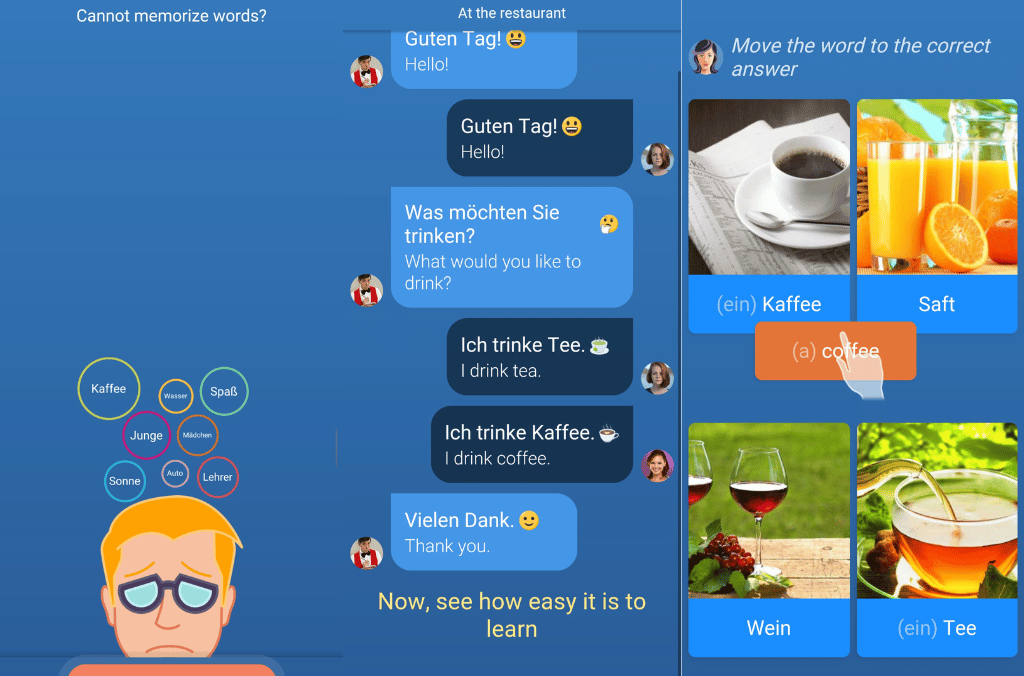
Here’s our full review of Mondly:
Mondly Review: Offers Innovative Technology But Won’t Get You All the Way to Fluency | FluentU Language Learning Blog
Mondly lets you use AR, robots and other nifty tech to learn languages. But does it work? We tested the program to find out. Click here to read this in-depth review to see…
3. Best App for Learning with Video: FluentU
FluentU lets you learn by watching authentic videos, something you’re probably already doing anyway!
The way the app works is you choose a language and level, and then you get offered a large assortment of videos in that language (videos that are made by and for native speakers).
Choose a video that piques your interest and watch the clip with interactive subtitles that you can click on to reveal word definitions, word types, other grammatical information and links to other videos in which the word or phrase you selected appears.
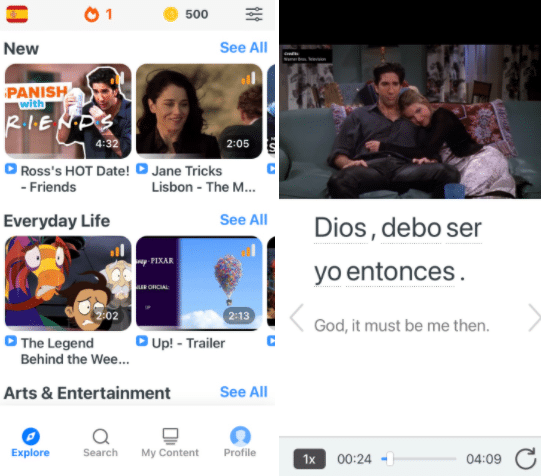
FluentU also offers personalized quizzes after each video so you can test your knowledge. You can also add words to customizable flashcard sets, so you’ll never forget the word again.
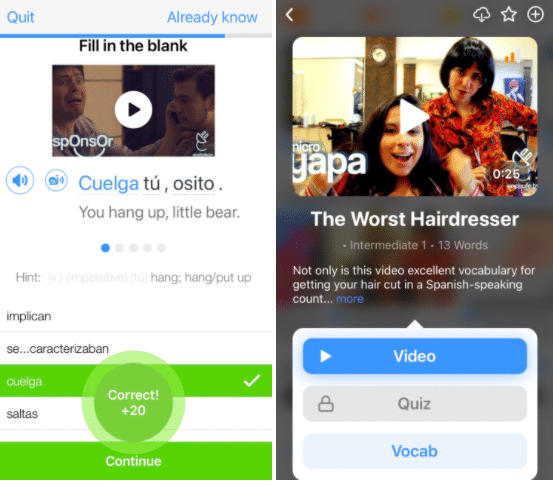
Overall, the app works very effectively by taking an activity you already like to do (watch YouTube videos, movie trailers, music videos, vlogs, etc.) and turning them into language learning lessons.
4. Best for Traditional Structured Courses: Babbel
Overview
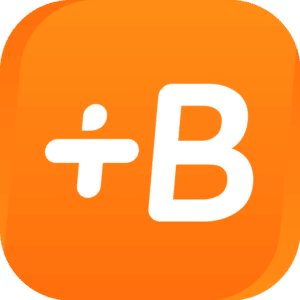
Name: Babbel
Description: The "world's first language learning app," based around 10-15 minute interactive lessons
Languages offered: 14
Offer price: Monthly subscription from $9.60/month up to a one-time fee of $190.99 for lifetime access
Summary
Babbel is a great app for anyone just starting a new language, with content that can provide a solid foundation for later learning. However, the app is limited in scope, with inconsistent amounts of content across languages.
-
User friendliness - 9/109/10
-
Delivers on promises - 8/108/10
-
Authenticity - 8/108/10
-
Value for price - 6/106/10
Pros
- Teaches applicable, useful conversational language
- Lessons build upon previous knowledge
- Includes language tips within lessons about grammar, formality, sentence structure, etc.
Cons
- Limited language choice, considering the age of the app
- Amount of content and features offered are inconsistent across languages
- Not all languages offer intermediate or advanced levels
- Not enough variety in exercise format
Babbel, one of the most well known language learning apps, uses several methods to teach practical language in short and totally 10-15 minute sessions. The app aims to improve your confidence and comprehension through traditional, yet interactive courses.
These courses offer exercises for reading, writing, listening and speaking, ensuring a well-rounded language education, and there are levels available for all learners from beginners to advanced students.
Babbel offers 14 language options.
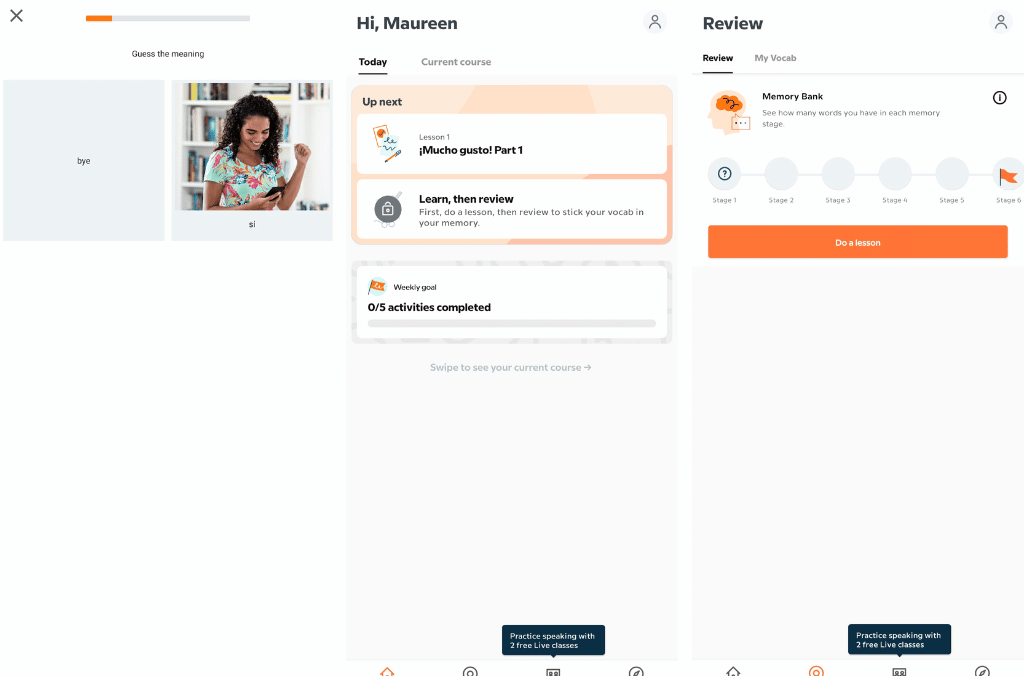
Here’s our full review of Babbel in case you’re interested:
Babbel Review: Solid Foundation for New Language Learners [Updated for 2024] | FluentU Language Learning Blog
Read our Babbel review to see whether the popular language learning program delivers on its promises! See all the ins and outs of Babbel and its main features, what we…
5. Best App for Vocabulary: Memrise
Overview
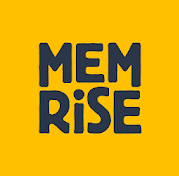
Name: Memrise
Description: User-friendly program based around spaced-repetition and authentic videos.
Languages offered: 22 languages offered, including Spanish, French, German, Japanese, Dutch, Turkish, Yoruba, Icelandic and more.
Offer price: Free version available, with Pro version at $22.99/mo, $71.99/yr or $100 for lifetime access
Summary
Memrise harnesses spaced repetition technology to help you master new words and phrases with full control over your learning. It’s also a monster directory for vocabulary in many languages. Just don’t expect a lot of grammar explanations.
-
User friendliness - 9/109/10
-
Delivers on promises - 8/108/10
-
Authenticity - 10/1010/10
-
Value for price - 6/106/10
Pros
- Methods backed up by solid science
- High-quality video and audio
- Customizable learning where you set your own goals
Cons
- Words and phrases taught in isolation, not in context
- Limited grammar explanations
Memrise, which started out as just a flashcard app, teaches you vocabulary through video clips of natives and lots of spaced repetition.
Through a variety of games, videos featuring native speakers and simulated text-message conversations, you’ll use your target language in a number of different entertaining contexts.
I find Memrise super fun and user friendly, and I still use it for its excellent customizable flashcards.
Memrise offers over 20 language options.
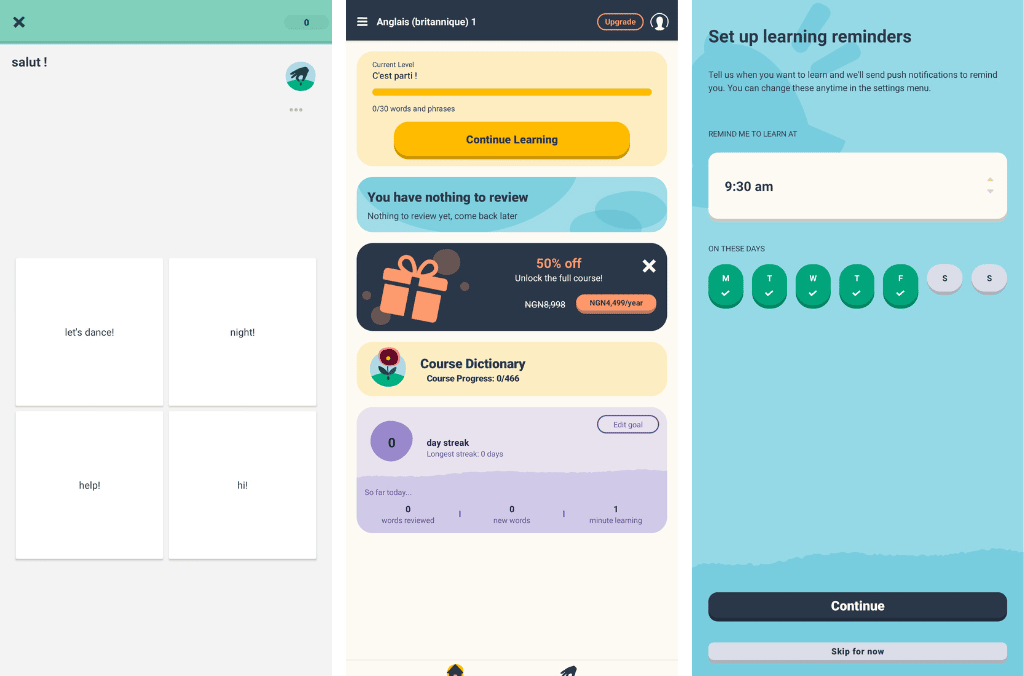
Here’s our full review of Memrise:
Memrise Review: Lots of High-quality Language Courses, but Limited Free Content | FluentU Language Learning
Can you master a foreign language with Memrise? In this review, we’ll investigate how the Memrise program teaches languages and whether it’s worth the cost of a…
6. Best for Immersion Learning: Rosetta Stone
Overview

Name: Rosetta Stone
Description: A language learning software established in the 1990s.
Languages offered: 25 languages including Spanish, French, Japanese, Italian, Dutch, Arabic, Greek, Vietnamese and more.
Offer price: Monthly subscription from $15.99 per month
Summary
Rosetta Stone has been a language learning giant since the 1990s. Today, it continues its legacy with an updated interface and streamlined instruction, but falls short of providing a comprehensive language learning experience because it lacks interactive features and explicit grammar instruction.
-
User friendliness - 7/107/10
-
Delivers on promises - 8/108/10
-
Authenticity - 6/106/10
-
Value for price - 7/107/10
Pros
- Strong emphasis on common words and phrases
- Has speaking and pronunciation instruction
- Offers lessons with real native speakers of your target language
Cons
- Lacks explicit grammar instruction
- Not optimized for spontaneous language usage (like conversations)
- Exercises can get repetitive
Rosetta Stone teaches you a language by completely immersing you. If you’re studying Spanish, you don’t see any English words. You just see images of the words. If they’re teaching you the word for “monkey,” for example, which is mono in Spanish, you just see a cute monkey sitting in a tree.
This approach mirrors the way you learned your first language as a kid.
The app also has some good speech recognition technology, so you can improve your accent along the way.
The Rosetta Stone app offers 24 language options.
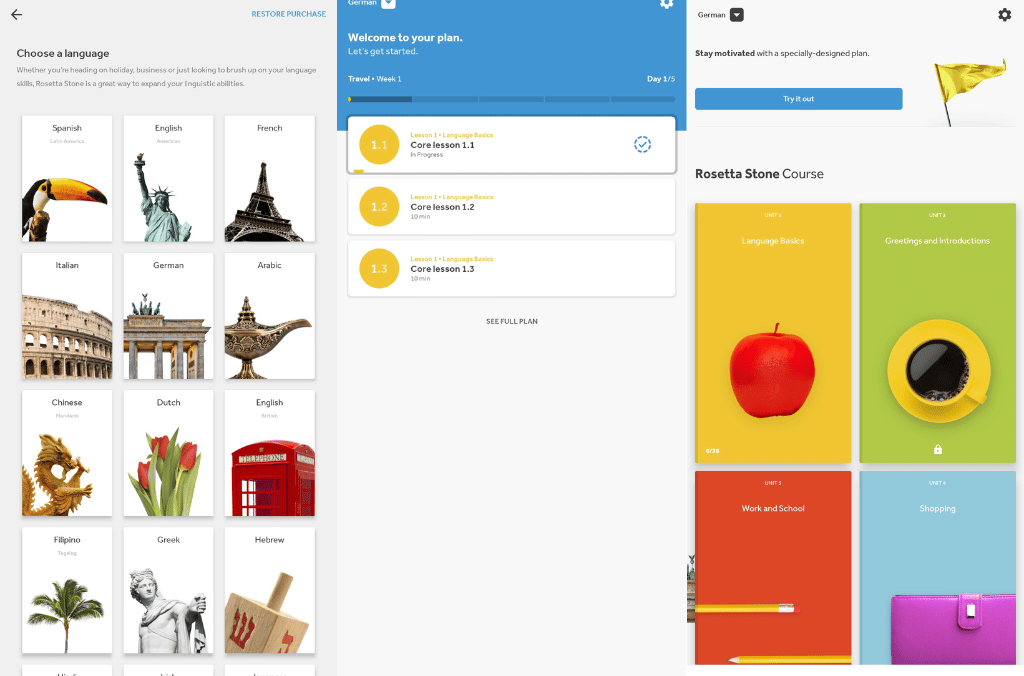
If you want to learn more, check out our full Rosetta Stone review here:
Full Rosetta Stone Review: Effective Legacy Program but Lacks Interactive Features | FluentU Blog
Our full Rosetta Stone for 2024 is here. Read this review to find out whether Rosetta Stone is worth using and how it compares to its competitors! Rosetta Stone once…
7. Best for Audio-based Learning: Pimsleur
Overview

Name: Pimsleur
Description: A classic audio-based language program with a research-based method.
Languages offered: Offers 51 languages including Croatian, Czech, French, German, Greek, Hebrew, Japanese, Korean, Ukrainian and more.
Offer price: $20.95 per month
Summary
Pimsleur focuses heavily on effective and practical verbal communication as opposed to reading and writing, so while it is effective for some it may not be the right fit for others.
-
User friendliness - 7/107/10
-
Delivers on promises - 9/109/10
-
Authenticity - 9/109/10
-
Value for price - 7/107/10
Pros
- Hands-free and convenient
- Teaches practical language
- Can help build confidence with speaking
- Can aid in long-term memorization
Cons
- Not much speech variety
- Material not very thrilling
- Doesn’t teach you grammar explicitly
- Limited vocabulary
- Almost no writing and reading
Pimsleur consists of quick audio lessons based on spoken dialogues. Then, you get into the vocabulary and grammar in an old-school, explicit way. That’s why I recommend this program for those who don’t like immersion programs and want the basics explained in Spanish.
One of the best things about Pimsleur is that, since they’re all audio lessons, you can listen to them on the go—in the car, on headphones or while doing housework.
And each lesson has speaking prompts to help you develop your basic speaking skills.
Pimsleur is available in 51 languages with various levels and amounts of material.
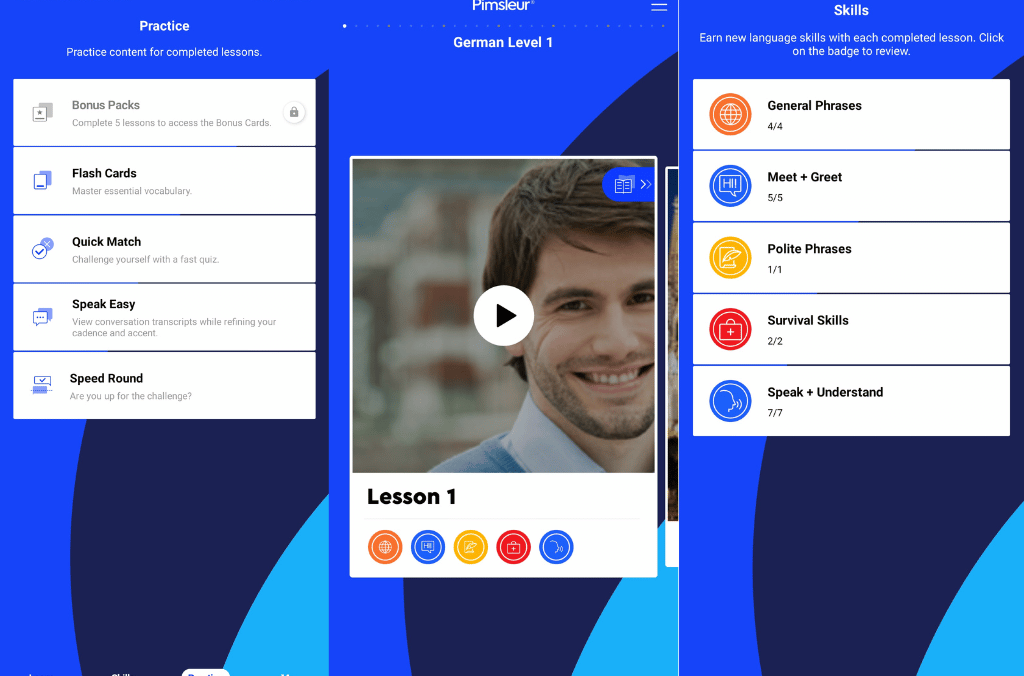
Here’s our full review of Pimsleur:
Pimsleur Review: Solid Audio Program, But It’s Not for Everyone | FluentU Language Learning
Is Pimsleur’s popular, audio-based language learning program right for you? I’ve put together an in-depth Pimsleur review to help you decide. Discover the pros and cons of…
8. Best Flashcards App: Lingvist
Pricing: $9.99/month, $79.99/year
Lingvist teaches you the 5,000 most useful words in a language with a flashcard system. Sounds great, right? Well I happen to think so, but I am partial to flashcards.
By focusing on the most common vocabulary, Lingvist aims to equip you with highly usable language skills that gets you talking right away. Plus, the app adapts to your needs in an attempt to maximize your learning.
The app’s vocabulary words are grouped into handy themes like hobbies, family, medical vocab and much more.
Lingvist offers six languages.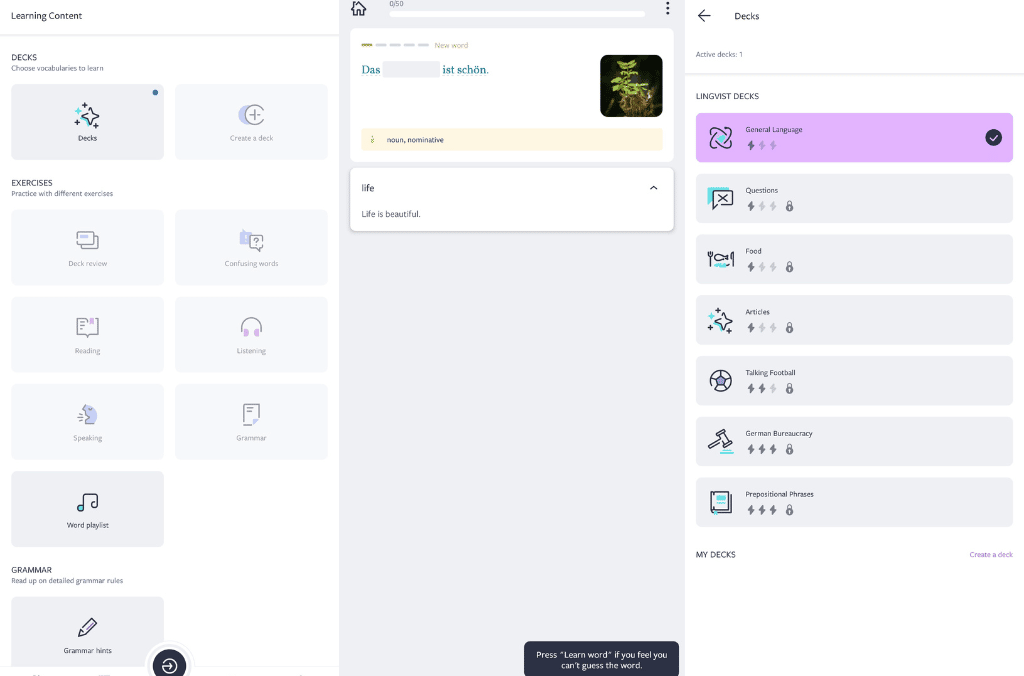
Here’s our full review of Lingvist:
Lingvist Review: Valuable Vocabulary Trainer, But Teaches in a Vacuum | FluentU Language Learning
Read our review of Lingvist, a language learning app that uses flashcards and spaced repetition to teach you vocabulary. But can this app quickly level up your language…
9. Best for Gamified Language Learning: Duolingo
Duolingo is famous for its short, interactive lessons that encourage you to build a daily streak. One of the hottest language learning products on the market, the app revolutionized language learning by making the experience like playing a game.
We now call this gamified, and Duolingo does it well by combining this approach with listening, spelling, writing and speaking practice.
And you’re always encouraged along by that cute little bird Duo.

If you’re interested in reading more about Duolingo, here’s our full review:
https://www.fluentu.com/blog/reviews/does-duolingo-work-review/
10. Best App for Visual Learning: Drops
Overview

Name: Drops
Description: Bite-sized language lessons to prevent burn-out.
Languages offered: 45 languages, including popular options like German, Chinese and Spanish, as well as more obscure options like Ainu and Igbo.
Offer price: Base program is free; Premium content available with a monthly subscription at $13/month, $69.99/year or $159.99 for lifetime access.
Summary
Drops is a fun and visually appealing app that teaches vocabulary through brief daily sessions. It over-emphasizes brevity, though, and its time-limits may be off-putting for some learners.
-
User friendliness - 10/1010/10
-
Delivers on promises - 9/109/10
-
Authenticity - 7/107/10
-
Value for price - 3/103/10
Pros
- Beautiful minimalist interface
- Consistent repetition-based vocabulary learning
- Ability to skip learned words
- Large variety of topics
- Useful language-specific extras, like Japanese kanji writing practice
Cons
- Has a daily five-minute limit for free users
- Only teaches vocabulary
- Minimal audio and no conversation practice
- Paid version doesn’t have much extra content
Drops teaches over 3,000 words through five-minute matching games, which, for me with a short attention span, is exactly how I want to learn.
And Drops always includes interesting visuals in a way that just makes your learning more fun. Drops started off as a flashcards app, but there are lots of other fun activities to do on the app now, while still focusing on building your vocabulary.
Drops currently has over 40 language options.
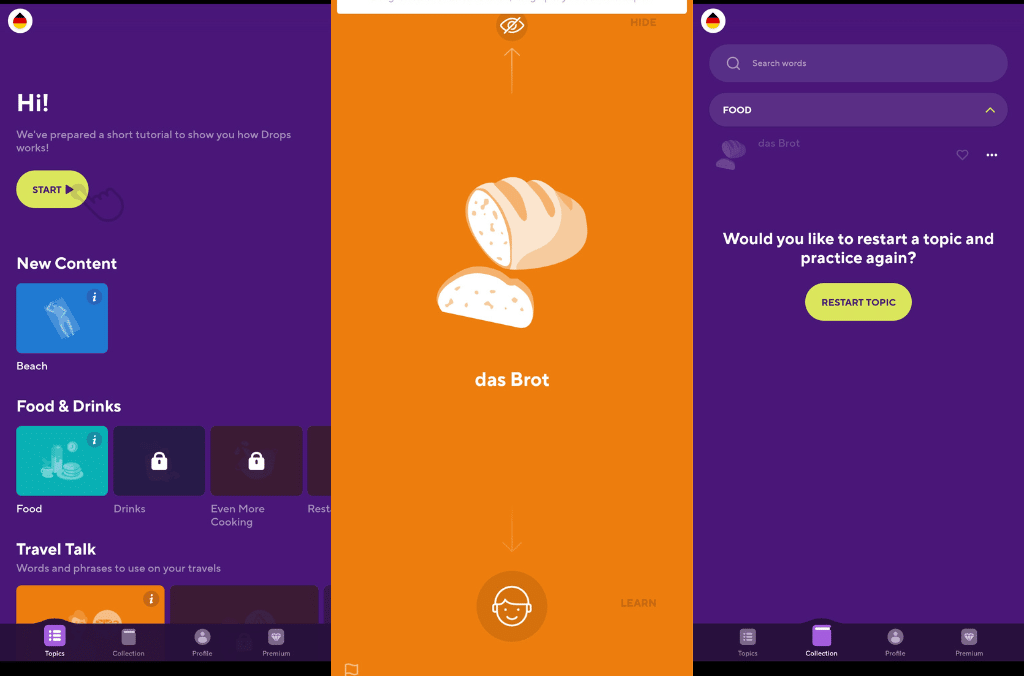
Here’s our full and unbiased review of Drops:
Drops App Review: Worth a Free Download, But Won’t Make You Fluent | FluentU Language Blog
Click here to check out my in-depth Drops app review to explore the app’s features, pricing, pros and cons and more. As a language learner, you’ve probably heard of Drops…
11. Best for Reading Fans: Beelinguapp
Pricing: $49.90/year, $63.90/year for family plan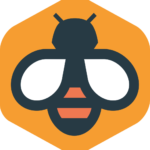
Beelinguapp’s signature side-by-side language comparison tool pairs well with its wide range of media options.
Pun intended—Beelinguapp teaches 13 languages through a combination of engaging media, including novels, stories, news and song lyrics.
The variety of media helps keep things fresh! There’s even a handy audiobook option that allows you to listen along with each story.
The app shows you a story in two languages, side-by-side, so you can constantly compare meanings and follow along easily.
Combine that with its immersive audio feature, and you’ll be learning a new language using two senses at once!
12. Best App for Language Exchange: HelloTalk
Overview

Name: HelloTalk
Description: A language exchange app that aims to connect language learners with other language learners and native speakers.
Over 150 languages offered.
Offer price: Much of the program available for free; monthly subscription from $12.99/month, $79.99/year or $149.99/lifetime access
Summary
This app provides a fruitful way to connect with native speakers of your target language and create meaningful learning experiences. It uses a social media-like experience to connect you with native speakers in over 150 languages. However, since this app is entirely user-led, I recommend using the service in tandem with other language learning methods.
-
User friendliness - 9/109/10
-
Delivers on promises - 9.1/109.1/10
-
Authenticity - 10/1010/10
-
Value for price - 9/109/10
Pros
- Has various ways to connect, including text messaging, voice and video chat
- Combines language learning with social media
- Gets you naturally interacting with your target language
- Built to support language interaction
Cons
- User-led content and interactions can mean errors
- Conversations tend to stall past the small talk stage
HelloTalk helps you find and connect with native speakers for language practice. Having a language partner is probably my top tip for those who really want to get fluent in a language.
With HelloTalk, this is easy: you can chat with native speakers and participate in group chats and community threads.
You can search for your perfect partner by language, location, interests and more, so if you’re lucky, you’ll also make a friend.
Once you find the perfect language partner, the app can also help you connect through text, audio or video.
HelloTalk also offers translation, transliteration, grammar correction and more.
HelloTalk offers these features in over 150 languages.
If you’re interested in reading more about HelloTalk, see how full review here:
HelloTalk Review: Valuable Tool for Language Learners But Matchmaking Could be Improved | FluentU Language Learning
In this review of HelloTalk, we take an in-depth look at the language exchange app and scrutinize its best (and worst) features, including their social media-like…
So now you have 12 great options of apps to learn the language of your dreams. I recommend experimenting with a few of them, and combining a flashcards app like Memrise with a language partner app like HelloTalk to really get fluent quickly.
Download: This blog post is available as a convenient and portable PDF that you can take anywhere. Click here to get a copy. (Download)
